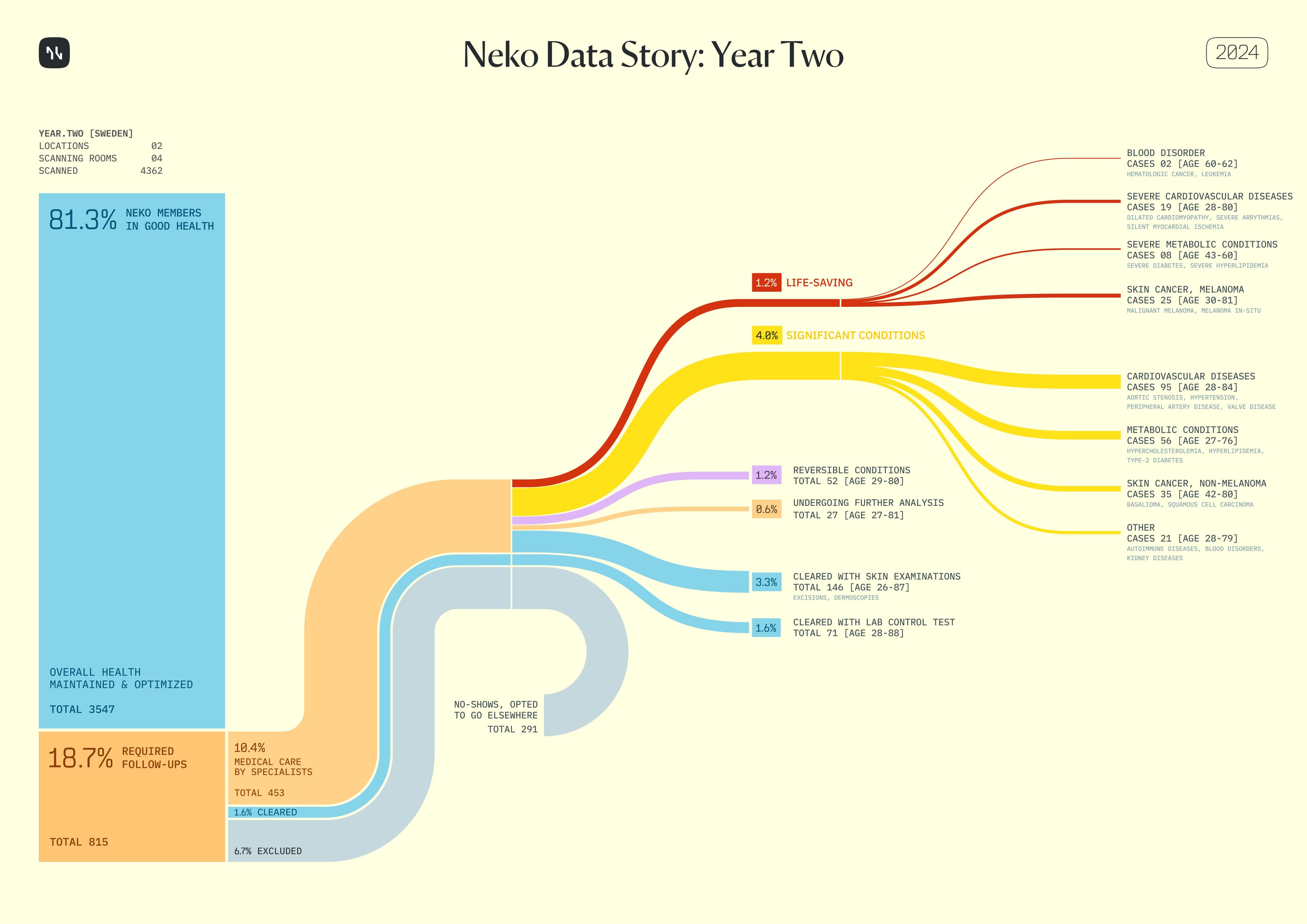Neko Data Story: Year Two
In 2024, our second year in operation, 4,362 people came to Neko Health for a scan in Stockholm, Sweden. This included 2,885 first-time scans and 1,477 follow-up scans.
In this report, we present a summary of the medical findings detected through Neko Health and include a sub-analysis of returning members who were diagnosed with life-threatening or significant conditions in 2023.
Each diagnosis was categorized into one of three groups:
Life-saving: Conditions requiring urgent medical attention and treatment
Significant: Conditions clearly in need of medical treatment
Reversible: Conditions that can be reversed through timely intervention
While this is not a scientific study with a control group, we believe it’s important to share our findings transparently and contribute to the broader knowledge of preventive healthcare and the real-world impact of early detection.
Key Findings

Overview
81.3% (3,547 members) were in good health and required no further medical follow-up.
18.7% (815 members) were referred for follow-up, including further testing or specialist review:
1.2% (54 members) were found to have a previously unknown life threatening condition requiring immediate medical attention.
4.0% (174 members) were diagnosed with a significant health condition.
1.2% (52 members) were diagnosed with a reversible condition.
0.6% (27 members) are still undergoing further investigation.
4.9% (217 members) were cleared after follow-up tests
6.7% (291 members) chose to be referred to their existing healthcare provider or did not attend their appointment.
Life-saving or severe diagnoses: 1.2% (54 members)
1.2% (54 members) were found to have a previously unknown life-threatening condition requiring immediate medical attention. 73% male / 27% female.
Examples include:
Skin cancer, melanoma (25 cases)
Ages 30–81, 68% male / 32% female
· Malignant melanoma, melanoma in-situSevere cardiovascular disease (19 cases)
Ages 28–80, 76% male / 24% female
· Silent myocardial ischemia, dilated cardiomyopathy, severe arrythmiasSevere metabolic condition (8 cases)
Ages 43–60, 88% male / 12% female
· Severe diabetes, severe syperlipidemiaSevere blood disease (2 cases)
Ages 60–62, 50% male / 50% female
· Hematologic cancer, Leukemia
Significant health conditions detected: 4.0% (174 members)
4.0% (174 members) were diagnosed with moderate to significant conditions that required medical attention. 62% male / 38% female
Examples include:
Cardiovascular diseases (95 cases)
Ages 28–84, 67% male / 33% female
· Hypertension, valve disease, aortic stenosis, peripheral artery diseaseMetabolic conditions (56 cases)
Ages 27–76, 60% male / 40% female
· Type 2 diabetes, hyperlipidemiaSkin cancer, non-melanoma (35 cases)
Ages 42–80, 55% male / 45% female
· Basalioma, squamous carcinomaOther conditions (21 cases)
Ages 28–79, 44% male / 56% female
· Autoimmune diseases, kidney disorders, blood disorders
Reversible conditions & early risk markers: 1.2% (52 members)
1.2% (52 members) were found to have early-stage or reversible conditions. These can often be addressed through primary prevention and monitoring. Ages: 29–80 years.
Examples includes:
Elevated blood pressure
Prediabetic blood sugar levels
Heart rhythm irregularities
Pre-cancerous skin changes
Cleared after additional follow-up or testing: 5% (217 members)
5% of all members were cleared after follow up test
Cleared with skin follow-up: 146 (3.3%), Ages 26–87
Cleared with lab tests: 50 (1.2%), Ages 28–88
Cleared with ECG or BP tests: 21 (0.5%), Ages 26–81
Under ongoing investigation: 0.6% (27 members)
0.6% (27 members) are currently undergoing further medical evaluation following their initial scan. These cases are still being assessed to determine whether follow-up care or diagnosis is required. Ages: 27-81 years.
Scan results among subgroup of returning members
Among our 1477 members coming back for their second scan in 2024, 113 members were previously diagnosed with a life-threatening or significant condition in 2023.
87 members (77.0%) were found to be in good health or had their condition under control — including 6 members who had required a life-saving intervention in 2023
10 members were cleared after follow up tests.
26 members (23.0%) required medical intervention
5 members were diagnosed with a new life-threatening condition
12 members were diagnosed with a new significant condition
9 members needed optimized treatment of their previously detected condition in 2023.
Summary
1) 4 out of 5 of members were in good health
81.3% of the 4,362 members required no medical follow-up, showing that most individuals who undergo the scan are either healthy or have reached their treatment goals for their condition. We believe this is the most important group of people, and we want them to continue to stay healthy for as long as possible.
The results reinforce what we saw in our initial year and add even more clarity into what the Neko Body Scan helps uncover – see last year’s data: https://www.nekohealth.com/se/en/neko-data-story-year-one
2) 6.4% of scans resulted in important medical findings:
1.2% of all scans were potentially life-saving
4% of all members had a significant health condition
1.2% of all our members had a reversible health condition. These are actionable findings that can be managed before they become chronic.
3) 3 in 4 returning members with prior severe and life-threatening conditions were in good health or under control
Among 113 returning members with prior life-saving/significant diagnoses, 77% had their condition under control or were in good health in their second scan.
Note & Disclaimers
Neko Health doctors review all scan results. When a condition is suspected, a complimentary in-house follow-up is provided. Should the member require additional medical treatment, they are referred to an external healthcare provider.
Atrium is a primary care clinic owned by Neko Health and is a part of the Swedish national health service. The cost of members being referred to Atrium is covered by Neko Health.
This report includes only diagnoses formally documented with ICD-10 codes, collected through our affiliated primary care clinic and dermatology clinics.
The total number of diagnosed conditions is higher than the number of individuals in the "Life-saving /avoidance of severe injury" and "Significant health conditions" groups as some people had multiple diagnoses.
Change country
Choose country to see health centres and content specific to your location.